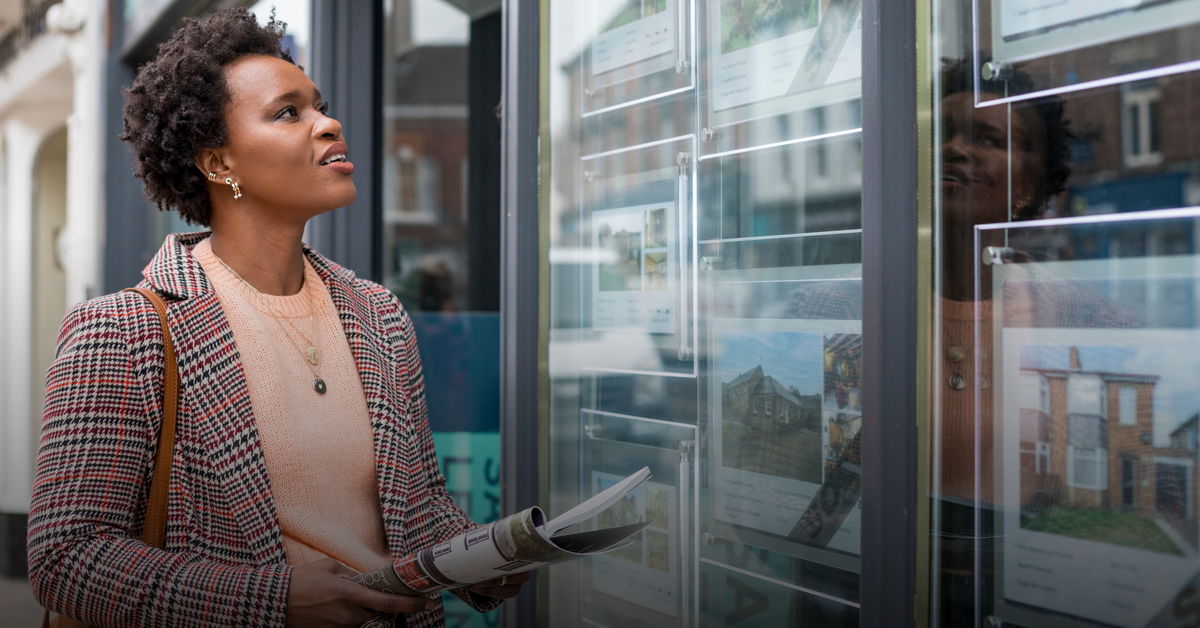
Everything you need to know about the house buying process in the UK
Moving to a new country can be an exciting yet challenging experience, especially when it comes to navigating unfamiliar processes such as the house-buying process.
For migrants in the UK, understanding the intricacies of the house buying process is essential for a smooth transition into homeownership. In this guide, we will walk you through the step-by-step timeline of purchasing a house in the UK.
Table of Contents
1. Understand your budget
One of the foundational steps in the UK house buying process is gaining a comprehensive understanding of your financial landscape. Here’s a detailed breakdown to guide you through this crucial initial stage:
Assess your finances
Begin by evaluating your current financial situation. Take stock of your income, savings and any other assets you may have. This assessment will give you a realistic overview of the funds available for your property purchase.
Consider additional costs
Homeownership involves more than just the property’s purchase price. Take into account additional costs such as stamp duty, legal fees, survey expenses and potential renovation or furnishing costs. These extras can significantly impact your overall budget.
Establish a realistic budget
With a clear understanding of your financial standing and the associated costs, establish a realistic budget. This figure will act as a guiding parameter when searching for properties, helping you focus on homes that align with your financial capacity.
Obtain a credit report
Your credit history plays a crucial role in securing a mortgage. Obtain a copy of your credit report and address any discrepancies or outstanding issues. A healthy credit score improves your eligibility for favourable mortgage rates.
Explore mortgage options
Research various mortgage options available in the UK. Different lenders offer different rates and terms, so understanding the market and exploring diverse mortgage products will help you make an informed decision.
Get a Mortgage Agreement in Principle (AIP)
Prior to house hunting, seek a Mortgage Agreement in Principle (AIP) from a reputable lender. The AIP provides an estimate of the amount you can borrow and demonstrates to sellers that you are a serious and financially qualified buyer.
Emergency fund
Consider building or maintaining an emergency fund alongside your property budget. This fund can be instrumental in covering unexpected expenses that may arise during the house-buying process or shortly after moving in.
Seek professional financial advice
If navigating the financial landscape seems daunting, consider seeking advice from a financial advisor. An advisor can provide personalised guidance based on your unique situation, helping you make informed decisions and ensuring financial stability throughout the process.
Embark on your home-buying journey with confidence. Secure your financial freedom and explore properties within your budget. TransferGo – your trusted partner in seamless online money transfers.
2. Get a mortgage agreement in principle
Understanding your budget is a crucial first step and obtaining a Mortgage Agreement in Principle (AIP) follows closely in the house buying process. This preliminary agreement from a mortgage lender is a pivotal document that provides you with a clear estimate of the amount they are willing to lend you.
Assess mortgage affordability
Once you have a clear picture of your budget, the next step is to assess your mortgage affordability. This involves considering the size of your deposit, your credit score and your overall financial health. Lenders use these factors to determine the amount they are willing to lend you.
Provide necessary documentation
To secure an AIP, you’ll need to provide certain documentation to the mortgage lender. This typically includes proof of income, employment details, information about your expenses and any outstanding debts. Ensuring you have these documents ready will streamline the AIP application process.
Shop around for lenders
The mortgage market in the UK is diverse, with various lenders offering different products and terms. Take the time to shop around and explore the offerings from different lenders. This will enable you to find the mortgage that best suits your financial situation and preferences.
Use the AIP to strengthen your position
Armed with an AIP, you are better equipped when making an offer on a property. Sellers often view buyers with an AIP more favourably, as it demonstrates your seriousness and financial eligibility. This can give you a competitive edge in a competitive property market.
Understand the conditions of the AIP
While an AIP is a positive step, it’s essential to understand the conditions associated with it. The final mortgage offer may vary based on the results of a full mortgage application and property valuation. Be aware of any conditions or requirements set by the lender.
Reassess if necessary
If your financial circumstances change or if you find a property outside the initially estimated budget, consider reassessing your mortgage options. It’s crucial to ensure that the mortgage aligns with the specific requirements of the property you intend to purchase.
Seek professional mortgage advice
Navigating the mortgage landscape can be complex, especially for migrants unfamiliar with the UK market. Consider seeking advice from a mortgage broker or financial advisor. These professionals can provide tailored guidance, help you understand the intricacies of various mortgage products and assist in securing the most favourable terms.
Unlock your dream home with a Mortgage Agreement in Principle. Count on TransferGo for swift and cost-effective money transfers, supporting your commitment to a new chapter in the UK.

3. Research and choose a location
Once you have a clear understanding of your budget and potential mortgage options, the next critical step in the house-buying process is to research and select the location where you want to purchase your new home.
Explore different neighbourhoods
Begin by exploring various neighbourhoods in the UK that align with your preferences and requirements. Consider factors such as proximity to work, access to public transportation, local amenities, schools and community atmosphere. Each neighbourhood has its unique character and offerings, so it’s essential to find one that suits your lifestyle.
Consider future development plans
Look into any future development plans or infrastructure projects in the areas you are interested in. This information can provide insights into potential changes in property values and the overall appeal of the neighbourhood. It’s an excellent way to make an informed decision about the long-term prospects of your chosen location.
Evaluate safety and security
Prioritise safety and security when choosing a location. Investigate crime rates in different areas and explore the presence of local law enforcement. Additionally, consider the availability of medical facilities and emergency services, ensuring that you are comfortable and secure in your new surroundings.
Factor in commute times
For those working or studying, factor in commute times to your workplace or educational institution. Understanding the transportation infrastructure and commute options will contribute to your overall satisfaction with your chosen location. Consider test-commuting during different times of the day to assess traffic patterns.
Look into local amenities
Evaluate the availability of local amenities such as grocery stores, parks, recreational facilities and shopping centres. The convenience of nearby amenities can significantly enhance your day-to-day living experience and contribute to the overall quality of life in your new home.
Connect with the community
Immerse yourself in the community by attending local events or joining community groups. This can provide valuable insights into the social fabric of the neighbourhood and help you integrate more seamlessly into your new environment. Understanding the local culture and dynamics is key to feeling at home in your chosen location.
Consider resale value
While purchasing a home is a significant personal investment, it’s also essential to consider the potential resale value of the property. Research property trends in the chosen location and assess whether it has a history of holding or appreciating in value. This foresight can be valuable should you decide to sell the property in the future.
Seek advice from locals
Engage with locals or expatriates who have already settled in the UK. Their first-hand experiences can provide valuable insights into different neighbourhoods and help you gain a more nuanced understanding of the local housing market. Online forums, community events and social media groups can be excellent resources for connecting with others.
As you navigate neighbourhoods, let TransferGo be your financial compass. Transfer money effortlessly, empowering your move to the perfect location in the UK.
4. Engage with a real estate agent
With a chosen location in mind, the next pivotal step in the house-buying process is to engage with a reputable real estate agent. A knowledgeable agent can be an invaluable ally in navigating the complex UK property market.
Research and shortlist agents
Start by researching and shortlisting real estate agents who specialise in the area you are interested in. Look for agents with a proven track record, positive reviews and a deep understanding of the local market dynamics. Recommendations from friends, colleagues or online reviews can provide valuable insights.
Schedule initial meetings
Once you have identified potential agents, schedule initial meetings to discuss your requirements, preferences and budget. These meetings are an opportunity to assess the agent’s communication style, expertise and willingness to understand your unique needs. Clear communication is essential for a successful partnership.
Clarify fees and services
During your meetings, clarify the fees associated with the real estate agent’s services. Most agents charge a percentage of the property’s sale price as their fee. Ensure you have a transparent understanding of all costs involved to avoid any surprises later in the process.
Understand local market trends
A seasoned real estate agent will provide valuable insights into local market trends, property values and potential growth areas. Leverage their knowledge to make informed decisions about property options in your chosen location. Discuss your priorities, such as specific features or amenities and listen to their recommendations.
Property viewing assistance
Once you’ve communicated your preferences, the real estate agent will coordinate property viewings tailored to your requirements. They will accompany you to these viewings, offering guidance and answering any questions you may have about the properties and the neighbourhoods.
Negotiation expertise
When you find a property you’re interested in, your real estate agent will play a key role in the negotiation process. They will use their expertise to secure the best possible deal on your behalf, taking into account market conditions and the property’s unique attributes.
Due diligence support
As you progress toward making an offer, the real estate agent will assist with due diligence, ensuring that all necessary checks are conducted on the property. This includes legal checks, property surveys and any other inspections required to validate the condition of the home.
Coordinate with other professionals
A reputable real estate agent often works in collaboration with other professionals, including solicitors, surveyors and mortgage brokers. They can recommend trusted professionals in these fields, streamlining the overall process and ensuring a coordinated approach to your property purchase.
Stay informed throughout the process
A good real estate agent keeps you informed at every stage of the buying process. Regular updates on the status of your offer, negotiations and any potential challenges ensure that you are well-informed and can make decisions with confidence.
Build a long-term relationship
Building a positive and long-term relationship with your real estate agent is beneficial not only for your current purchase but also for any future real estate transactions. A trusted agent can become a valuable resource for your ongoing property-related needs.
Seal the deal with a top real estate agent and let TransferGo streamline your financial transactions. Move with ease as you find your ideal property in the vibrant UK market.
5. View properties
Having enlisted the expertise of a real estate agent, the next exciting step in the house buying process is to browse properties on websites like Rightmove and take the first steps to organising property viewings. This hands-on experience allows you to assess potential homes, neighbourhoods and envision your life in your new residence.
Schedule viewings
Work closely with your real estate agent to schedule viewings for properties that align with your preferences and budget. Ensure that you allocate sufficient time for each viewing to explore the property thoroughly and ask any questions that may arise.
Assess the exterior
As you approach each property, take note of its exterior features. Evaluate the condition of the building, the neighbourhood atmosphere and any outdoor spaces. Consider factors such as parking, garden areas and the overall curb appeal of the property.
Explore the interior
Once inside, carefully explore each room, paying attention to the layout, size and condition of the interior spaces. Take note of any potential maintenance or renovation needs and envision how the property suits your lifestyle and furnishing preferences.
Ask questions
Don’t hesitate to ask your real estate agent questions during the viewing. Seek information about the property’s history, any recent renovations or improvements and details about the local community. Understanding the nuances of each property will assist you in making informed decisions.
Consider future needs
While viewing a property, consider its suitability for your future needs. If you plan on expanding your family or working from home, assess whether the property can accommodate these changes. This forward-thinking approach ensures that your investment meets both your immediate and long-term requirements.
Take notes and photos
To help differentiate between properties, take detailed notes and photographs during each viewing. Capture key features, potential concerns and any standout aspects of the property. These visual and written records will prove invaluable when making your final decision.
Visit multiple properties
Viewing multiple properties allows you to compare and contrast different options. It provides a broader perspective on the market, helping you refine your preferences and priorities. Your real estate agent can offer guidance based on your feedback, narrowing down the options to those that best suit your needs.
Consider surrounding amenities
Assess the proximity of each property to essential amenities such as schools, public transportation, healthcare facilities and shopping centres. Consider the convenience of accessing these amenities from your potential new home and how they align with your lifestyle.
Evaluate natural light and ventilation
Pay attention to the amount of natural light and ventilation in each property. Well-lit and well-ventilated spaces contribute to a comfortable living environment. Consider the orientation of the property and how it impacts natural light throughout the day.
Trust your instincts
While data and analysis are essential, don’t underestimate the power of your instincts. Consider how each property makes you feel. If a particular home resonates with you, it may be a sign that it aligns well with your preferences and lifestyle.
Step into your potential new home with confidence. Trust TransferGo for secure and speedy money transfers, ensuring you’re ready to make the right move in the UK property market.

6. Make an offer
After exploring various properties and identifying the one that resonates with your preferences and needs, the next crucial step in the house-buying process is to make a formal offer. This stage involves negotiation, careful consideration of market conditions and collaboration with your real estate agent to secure a favourable deal.
Consult with your real estate agent
Before crafting an offer, consult with your real estate agent to gather insights into the current market conditions and recent comparable sales. Their expertise is invaluable in determining an appropriate and competitive offer that aligns with the property’s value.
Evaluate the property’s value
Consider the unique features of the property, any recent renovations or improvements and its overall condition. This assessment, combined with information about similar properties in the area, will help you arrive at a fair and reasonable offer.
Submit a written offer
Craft a written offer that clearly outlines the proposed purchase price, any conditions or contingencies and the expected timeline for the transaction. Your real estate agent will present this offer to the seller or their representative.
Negotiate terms
Negotiations are a standard part of the house-buying process. Be prepared for potential counteroffers from the seller. Your real estate agent will facilitate these negotiations, ensuring that your interests are represented and helping you achieve a mutually acceptable agreement.
Consider additional inclusions or conditions
Alongside the purchase price, consider any additional inclusions or conditions you would like to include in the offer. This may involve negotiating for certain appliances, furniture or specifying repairs that you’d like the seller to address before the sale is finalised.
Be prepared for multiple offers
In a competitive market, there’s a possibility of facing multiple offers on the same property. Your real estate agent can guide you on how to navigate such situations, ensuring that your offer stands out and remains competitive.
Review the seller’s response
Once your offer is presented, the seller will respond with either an acceptance, rejection or a counteroffer. Review the response carefully with your real estate agent, considering both the financial and non-financial aspects of the deal.
Formalise the agreement
Once both parties reach a consensus on the terms, a formalised agreement is drawn up. This document outlines the terms and conditions of the sale and is signed by both the buyer and the seller. At this point, the transaction becomes legally binding.
Provide earnest money
As a sign of your commitment to the purchase, it’s customary to provide earnest money along with the formal offer. This is a deposit that is typically held in escrow and applied towards the purchase price at the closing. The amount may vary, but it’s a demonstration of your serious intent to proceed with the transaction.
Seek legal advice
Before finalising the offer, it’s advisable to seek legal advice from a solicitor or conveyancer. They can review the terms of the offer and the ensuing agreement, ensuring that your legal interests are protected throughout the transaction.
Make your offer stand out, backed by the efficiency of TransferGo. Navigate negotiations and secure your dream home with the assurance of seamless online money transfers.
7. Conveyancing and legal process
After successfully negotiating and finalising the offer, the house-buying process enters the legal phase, commonly known as conveyancing. This crucial step involves the legal transfer of property ownership and ensures that all necessary checks are conducted to safeguard the interests of both the buyer and the seller.
Engage a solicitor or conveyancer
The first step in the legal process is to engage a solicitor or conveyancer who specialises in property transactions. This legal professional will act on your behalf, handling the necessary legalities and paperwork and liaising with the seller’s legal representative.
Property title and ownership checks
Your solicitor or conveyancer will conduct thorough checks on the property title to verify ownership and identify any potential legal issues. This process ensures that the property can be legally transferred to you without complications.
Searches and surveys
As part of the conveyancing process, various searches are conducted. These may include local authority searches, environmental searches and water and drainage searches. Additionally, a property survey is typically arranged to assess the condition of the property and identify any potential structural issues.
Review contract and conditions
Your legal representative will review the sale contract provided by the seller’s solicitor. They will ensure that the terms and conditions are fair and in line with your expectations. Any necessary negotiations or clarifications are handled during this stage.
Raise enquiries
If any concerns or questions arise during the legal process, your solicitor or conveyancer will raise enquiries with the seller’s representative. This could involve seeking additional information about the property, clarifying terms in the contract or addressing any discrepancies uncovered during the searches.
Address mortgage requirements
Work closely with your mortgage lender to fulfil any outstanding requirements or conditions related to your mortgage application. Your solicitor or conveyancer will liaise with the lender to ensure that all necessary documentation and information are provided in a timely manner.
Exchange of contracts
Once all legal checks are completed and both parties are satisfied with the terms, the exchange of contracts takes place. During this step, you and the seller commit to the sale and the transaction becomes legally binding. At this point, you will typically pay a deposit, usually a percentage of the property’s purchase price.
Settlement and completion date
The completion date, also known as the settlement date, is agreed upon during the exchange of contracts. This is the day when the remaining balance of the purchase price is paid and legal ownership of the property is transferred to you. Your solicitor will coordinate with the seller’s legal representative and manage the financial aspects of the transaction.
Finalise mortgage arrangements
In preparation for the completion date, ensure that all necessary mortgage arrangements are in place. This includes finalising the mortgage loan and having the funds available for the remaining balance to be paid on the agreed-upon date.
Attend final inspection
Before completion, it’s customary to conduct a final inspection of the property to ensure that it is in the agreed-upon condition. This provides an opportunity to confirm that any agreed-upon repairs have been addressed and the property is ready for handover.
Receive keys and legal documents
On the completion date, the remaining balance is transferred to the seller and you officially become the legal owner of the property. You will receive the keys to your new home, along with all relevant legal documents confirming the transfer of ownership.
Navigate the legal intricacies effortlessly with TransferGo by your side. From searches to surveys, trust us to ensure your financial transactions align seamlessly with the UK’s legal requirements.
8. Survey and mortgage application
As the legal process advances, it’s essential to concurrently progress with the survey of the property and the finalisation of your mortgage application. This step involves thorough examinations to ensure the structural integrity of the property and the completion of all requirements with your chosen mortgage lender.
Schedule a property survey
Engage a qualified surveyor to conduct a comprehensive survey of the property. The survey aims to identify any potential issues with the structure, plumbing, electrical systems and overall condition of the property. The findings from the survey will provide valuable insights and may influence your decision to proceed with the purchase.
Select the type of survey
There are different types of property surveys, ranging from basic to more detailed inspections. Your choice may depend on the age and condition of the property, your risk tolerance and the mortgage lender’s requirements. Common types include a Homebuyer Report, Building Survey and Condition Report.
Review survey findings
Once the survey is complete, the surveyor will provide a report detailing their findings. Review this report carefully with your solicitor and real estate agent. If any issues are identified, discuss potential solutions with the seller, such as repairs or adjustments to the sale price.
Progress with the mortgage application
While the survey is underway, continue to progress with your mortgage application. Provide any additional documentation or information requested by your mortgage lender promptly. Clear communication with your lender and meeting their requirements in a timely manner is crucial to ensure a smooth mortgage approval process.
Valuation by the lender
As part of the mortgage application process, the lender will conduct a valuation of the property. This is to ensure that the property’s value aligns with the loan amount. While the valuation is primarily for the lender’s benefit, it can also provide you with additional information about the property’s market value.
Address survey and valuation concerns
If the survey or valuation reveals issues, work closely with your solicitor and real estate agent to address them. This may involve negotiating with the seller to undertake necessary repairs or adjusting the terms of the agreement. Your solicitor can guide you on the best course of action to protect your interests.
Secure mortgage approval
Once the survey and valuation are satisfactory and all necessary documentation is provided, your mortgage lender will issue a formal mortgage offer. This document outlines the final loan terms, including the interest rate, repayment schedule and any conditions that must be met before completion.
Coordinate survey and mortgage timeline
Coordinate the timeline of the survey and mortgage approval process to align with the overall house-buying schedule. Ensuring that these processes progress concurrently helps avoid delays and ensures that you are well-informed about the property’s condition before committing to the purchase.
Stay informed
Throughout the survey and mortgage application stage, stay informed about the progress of each process. Regular communication with your solicitor and real estate agent is essential to address any concerns promptly and ensure that all aspects are moving forward smoothly.
Prepare for additional costs
Be prepared for potential additional costs that may arise based on the survey findings. If repairs or further investigations are required, factor these into your budget. Your solicitor can provide guidance on negotiating with the seller to share or cover these costs.
As you survey your potential home, let TransferGo handle the financial side. Secure your mortgage and transfer funds with ease, ensuring a smooth transition to homeownership in the UK.

9. Exchange of contracts
With the legal and financial aspects well underway, the house-buying process advances to a significant milestone: the exchange of contracts. This step marks the point at which both buyer and seller commit to the transaction and the agreement becomes legally binding.
Finalise legal checks
Before the exchange of contracts, your solicitor or conveyancer will finalise all legal checks on the property. This includes ensuring that there are no outstanding issues with the title, addressing any queries or concerns raised during the conveyancing process and confirming that the property adheres to all relevant regulations.
Signing the contract
Once satisfied with the legal status of the property, you will be required to sign the contract. This is a formal document outlining the terms of the sale, including the agreed-upon purchase price, any additional conditions and the proposed completion date. Your signature indicates your commitment to the purchase.
Deposit payment
Simultaneously with signing the contract, you will typically be required to pay a deposit. The deposit is a percentage of the property’s purchase price and serves as a financial commitment to the transaction. This amount is held in an escrow account until completion, at which point it is deducted from the total purchase price.
Seller’s responsibilities
The seller also signs the contract and at this stage, they are legally obligated to sell the property to you under the agreed-upon terms. The seller’s solicitor or conveyancer will ensure that all necessary legal documentation is in order, addressing any outstanding matters.
Mutual agreement
Once both parties have signed the contracts and the deposit is paid, the contracts are exchanged between the solicitors or conveyancers. This exchange is typically done over the phone and both sides confirm the details of the transaction, including the completion date and any additional conditions.
Insurance considerations
At this point, it’s advisable to arrange insurance coverage for the property. Even though legal ownership has not yet been transferred, securing insurance ensures that the property is protected against unforeseen events from the moment the contracts are exchanged.
Binding commitment
The exchange of contracts represents a binding commitment for both parties. If either party fails to fulfil their obligations at this stage, they may be subject to legal consequences. The completion date, outlined in the contract, becomes the target date for the finalisation of the sale.
Remaining balance and mortgage arrangements
After the exchange of contracts, you have a window of time until the completion date to ensure that the remaining balance of the purchase price is secured. This involves finalising mortgage arrangements and having the necessary funds available to complete the transaction.
Settlement and handover
On the agreed-upon completion date, the remaining balance is transferred from your solicitor to the seller’s solicitor and legal ownership of the property is officially transferred to you. You will receive the keys to your new home, marking the successful conclusion of the house-buying process.
Celebrate and settle in
With the keys in hand and legal ownership confirmed, it’s time to celebrate your new homeownership. Take the time to settle into your new home, make any necessary arrangements for utilities and services and embrace the beginning of a new chapter in your life.
Exchange contracts with confidence, knowing TransferGo is facilitating your financial commitments. Move forward into the final stages of your home purchase with ease and financial clarity.
10. Completion
The final step in the house-buying process is completion, the day on which legal ownership of the property formally transfers to you. This culmination of the journey involves the settlement of the remaining financial aspects and the symbolic handover of the keys to your new home.
Confirm final details
In the days leading up to completion, your solicitor will confirm the final details of the transaction. This includes ensuring that all necessary legal documentation is in order, the remaining balance is available for transfer and any outstanding conditions outlined in the contract have been addressed.
Coordinate with the mortgage lender
If you have secured a mortgage, coordinate with your lender to ensure that the final funds are ready for transfer on the completion date. This involves confirming the exact amount required and any specific instructions provided by your solicitor.
Finalise utility and service arrangements
Ahead of the completion date, finalise arrangements for utilities and services in your new home. Notify service providers of the change of ownership, set up accounts in your name and ensure a smooth transition for essentials such as water, electricity, gas and internet services.
Transfer remaining balance
On the completion date, your solicitor will transfer the remaining balance of the purchase price to the seller’s solicitor. This is typically done electronically and once the funds are received, legal ownership of the property formally passes from the seller to you.
Receive keys and legal documents
Upon confirmation of the funds transfer, the seller’s solicitor will release the keys to your new home. Additionally, you will receive all relevant legal documents confirming the transfer of ownership. Take the time to review these documents and keep them in a secure location for future reference.
Notify relevant parties
Inform relevant parties of the completion, including your real estate agent, solicitor and mortgage lender. This ensures that everyone involved in the transaction is aware that the process has concluded successfully.
Celebrate the completion
Completion day is a significant milestone and it’s an opportunity to celebrate your achievement. Take a moment to appreciate the culmination of the house-buying journey, the realisation of your homeownership goals and the exciting prospect of settling into your new home.
Check the property condition
Upon receiving the keys, conduct a final walkthrough of the property to ensure that it is in the expected condition. If there were any agreed-upon repairs or adjustments, verify that these have been addressed. Report any discrepancies to your solicitor for resolution.
Update official records
After completion, update official records to reflect the change in ownership. This includes notifying the local council of the change for council tax purposes and updating your details with relevant authorities.
Settle into your new home
With legal ownership confirmed and keys in hand, it’s time to settle into your new home. Unpack, familiarise yourself with the property and begin the process of making it your own. Take the time to explore the local community and embrace the sense of accomplishment that comes with homeownership.
Celebrate completion day with the assurance of TransferGo. Ensure a smooth transition of funds, receive your keys and embrace homeownership in the UK with financial confidence.
Popular articles
Invite friends to TransferGo, earn £20










































































































































































